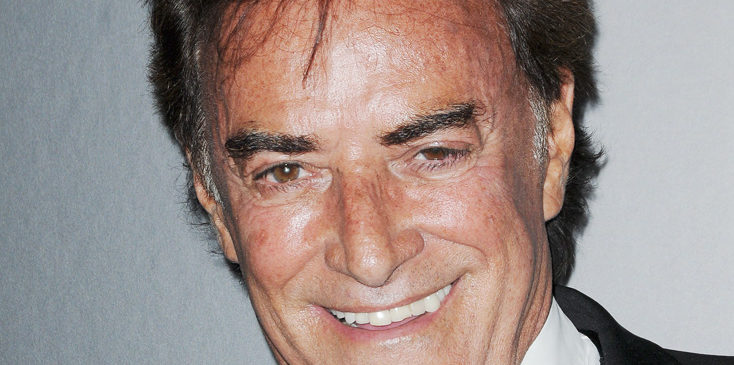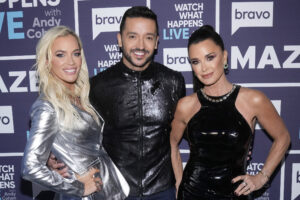DAYS’s Thaao Penghlis (Andre) explored his Greek and Australian roots on a recent trip home
In 1453, The Byzantine–Ottoman Wars resulted in the fall of Constantinople. After the Ottoman conquest of Greece, many of its inhabitants fled the region to Venice and Florence, Italy. Those who survived that war brought their ancient culture with them and influenced the Renaissance world. The exodus of Greeks continued into the 20th century to the United States, Canada and Australia. But for those who remained, 350 years of Turkish occupation forever changed the Greek character. Its true identity became hidden, camouflaged in order to survive a brutal regime. They kept their passions alive, their rage to themselves, but most importantly, their Christian faith was never denied. Their prayers became their survival. They went underground, into caves and shadowy spaces to preserve their history by secretly having priests school the young. They taught to save their language, music, their Byzantine existence and their ancient culture. “It was all done by candlelight, it was all done in a whisper.”
Waged by Greek revolutionaries, the great struggle against the Ottoman Empire ended in 1832. It was called the “War of Independence”. Greece was finally free. Well, for a while. My family left Greece in the 1930s from Kastellorizo, an island in the Dodecanese, two miles west from the Turkish mainland. Those character traits that evolved out of the struggle migrated to Australia, as well.
I had not been home to Australia in five years. My first jolt into the past was to visit the cemetery where my parents and relatives were buried. I couldn’t believe how many Greeks had died since I was last there. So many tombstones in different sizes, all according to those guilty memories. I glossed over new designs of symbolic tombstones, like looking through a forest of black granite.
Watching my sister attend to my parents’ simple headstone as she had done for over 20 years with such care was a tribute to the culture we respected and the love we shared. She replaced the dead flowers and lit the candle and blessed their spirit with frankincense. Standing there, I recalled with melancholy the culture that our ancestors had passed through to us, but much of it seemed to have died with them. Now it was just a whisper. A memory of times collected.
I was invited by [TV station] SBS to do an interview at Saint Sophia, a historical cathedral consecrated in February 1927 and recognized by the city as the first Greek Orthodox cathedral of Australia, in a suburb called Paddington. I had not been in that church since my youth. As I climbed the stairs, my memory exploded. So many of my relatives had stood there during Easter or after a christening wearing hats of the latest fashion. It was a competitive atmosphere, especially with the women. One Good Friday evening as the priest and his choir were chanting those mystical hymns, an altar boy holding a tall lantern tripped and poured the hot oil over some of the worshipers. A middle-aged woman’s hair caught fire and then her clothing. Out of a beautiful ceremony chaos ensued.
Those screams were hideous. I ran over, pushing my way up the stairs, taking off my jacket, subduing the flames. The ambulance arrived, she survived. I was 14.
I stepped inside the cathedral with my hands clasped in front of me, respecting God’s house, always a good gesture of humility.
I lit a candle and crossed myself and asked for a few miracles. Then I recalled my childhood, not quite a miracle. I took in my surroundings, remembering how beautiful the sounds of a classical Greek sermon are, while a soloist melodiously chanted. Even though I never understood its meaning, it certainly resonated.
I began paying attention to the imposing icons that filled the walls, especially that of St. Michael, the warrior saint. Well, he really wasn’t a saint but an angel, actually the “leader of all angels”. Maybe that’s why I became an actor; I seemed to have loved the sense of drama. It made things seem more important. As young as I was, guilt always revealed itself, especially on a Sunday morning. I felt the warrior himself staring back at me, “Okay what did I do now?”
They were all imposing. I smiled as I recalled those innocent times when, as a boy, I went to English school in the day and then to Greek school later in the afternoon, three times a week, as did the rest of my siblings. That school was located behind the church. The Greek language was then practiced in the household, as mother never spoke English.
We were Greek first, you see? Shockingly, if you spoke Greek in public there was always a true Aussie to remind you that, “This is Australia and we speak English here, and if you don’t like it then go back to where you belong.” “But I was born here,” I responded. Didn’t make a difference. The culture was still young and again we had to whisper.
But those memories had finally become a thing of the past. Going back this time it was wonderful to see the changes, the growth was apparent. Australia had evolved from its Anglo-Saxon image and become a country of the world. A new place beautifully made, built by the hands of immigrants that had come to the Australian shore and paved new roads, just like they did in America. As I had experienced so many cultures throughout my life as an immigration official and from the overseas journeys that followed, it became my greatest education; knowledge, I discovered, stops you from pointing. But it’s up to the individual’s education and the insights they take from it that results in their choices.
The interview went well with SBS. I even got teary-eyed when recalling my grandmother, who always wore black after my grandfather died. Her kitchen always permeated exotic aromas. The cinnamon toast, the honey wax where she made candles for the church, and gifting us with her blessings of wonderful colored Easter eggs and the aromatic Greek bread. As I was walking out, I knew in this sacred little space I had planted seeds. I was taught about boundaries, the importance of listening, and the respect for family. The warrior in me was to go beyond all this and use those tools on the path ahead. It was a great challenge, but those values gave me a foundation to work from. My whole time in Australia was spent with members of my family. All those years of going back were never like this. With most of our parents, uncles and aunts gone, there were remnants of the ancient culture left behind, but it was the cousins along with the nieces and nephews who were now conducting the new world and what diversity they had in their career choices. We never had that freedom and for me the only way to survive that Victorian time was to escape to the unknown.
For Christmas, my nephews Peter and Andrew were gifted a climb on the Sydney Harbour Bridge. And suddenly I was thrust back into my past. A magnificent harbour where I recalled shooting our second season of MISSION: IMPOSSIBLE [1989-90]. It was a mile and a half climbing those stairs, straight up and back around. The view was astonishing, the winds strong but the purpose clear. This, for me, was a first. To begin, we had to go through an hour rehearsal for safety purposes.
When we came down after three hours, we dined off the harbour at the latest Sydney restaurant along Coffs Harbour. I was astonished by the new Sydney skyline, beautifully executed with more Asians now than Europeans. It was wonderful to see the country’s evolution.
With [niece] Gaby, [nephews] Peter and Andrew, card games were a daily occurrence with my dear brother, George. We bonded exchanging stories every day of our past while taking our hourly walk; there was never a dull moment after all these years. Even though George and I grew up away from each other, our lives were filled with a deep, full and reverberating sound.
During my last week at home, some friends took me out for lunch at the Sydney Tennis Club. I was dressed casually in a summer jacket, open shirt and smart white sneakers. As we arrived inside the private club, the manager, who gave me a disconcerting look, asked me in a Noel Coward tone, “Sir, do you mind buttoning up your shirt?” And here I thought I was being sensual. “Of course not,” as I buttoned up. Next he remarked, “And Sir, do you have another pair of shoes?” Like who goes to a restaurant with an extra pair of shoes? “No,” I replied, “but these are expensive.”
I decided to walk ahead and ignore this pompous man from another century, for I realized how agreeable I had become in my maturity. It was a wonderful lunch and many stories were shared over oysters, salmon and white wine.
But what I discovered this time around was that I could go back home and be celebrated and know that there was a place where I could retire eventually, where family, my family, had evolved in a most special way.
You see, we didn’t have to whisper anymore.
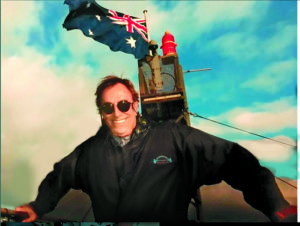
Point Of Pride: Penghlis made it to the top of the Sydney Harbour Bridge.
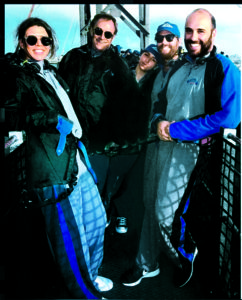
Family Time: “On top of the #sydney Harbour #Bridge with my brother George & Helen’s #family. The entire walk is over a mile. But what a view,” he posted.
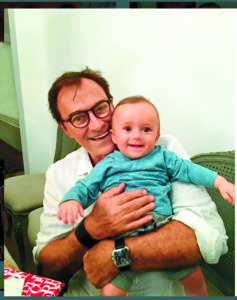
Isn’t It Great? “Spending time in #Australia with #family & my great nephew Emmanuel,” Penghlis shared.
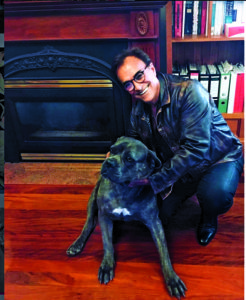
Man’s Best Friend: Penghlis found a friend in this pup while in Australia.
Check out our new podcast, Dishing With Digest!



